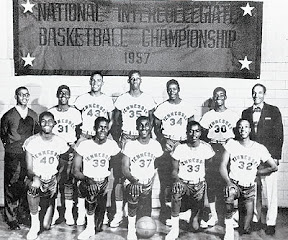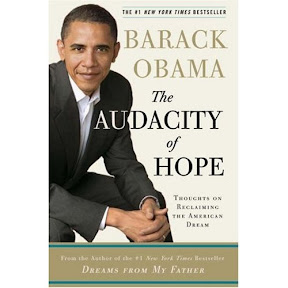Non-Primary Colors
The CMYK color model is an old standard subtractive coloring model used in color printing. There is of course the  Pantone Hexachrome coloring model, but let's not get ahead of ourselves. As a side note, the K in CMYK stands for Key, and the Key color is black. I am sure you also remember from art class of course that the primary colors (Red, Blue, Green) could not be mixed together or subtracted from each other to create black or white.
Pantone Hexachrome coloring model, but let's not get ahead of ourselves. As a side note, the K in CMYK stands for Key, and the Key color is black. I am sure you also remember from art class of course that the primary colors (Red, Blue, Green) could not be mixed together or subtracted from each other to create black or white.
Keeping this in mind, there has been much talk in the media lately about the preparedness of the United States for the possibility of having a Black man or Woman President. Inevitably, the discussion shifts to the depictions of Black men as President within mainstream media. The idea seems to be that mass media has made the concept of a Black President of the United States more "palatable" to the average American by his mere appearance in the movies and television. At this point the character played by Dennis Haysbert on the popular show 24, President David Palmer is trotted out, or Morgan Freeman who played President Tom Beck in Deep Impact is mentioned in order to illustrate that America is certainly more comfortable with the idea since they have already seen it happen, I guess.
This argument strikes me as a bit naive and somewhat faulty. Of course, it should be mentioned that David Palmer was assassinated and President Beck presided over the destruction of most of the Eastern Seaboard by a comet who classically admits at the end of final pre-apocalypse address to the American populous after all contingencies and back-up plans have failed, "that's it." Well, that is it. The movie is over, the season finale concludes and everyone goes back to the actualities of reality, no harm no foul, regardless of your political leanings. The justification for the palatability of such roles for African-Americans seems to derive from the apparent lack of a public outcry coupled with the observation that advertisers haven't pulled their commercials and that nobody is writing vitriolic screed about the presence of an African-American President in a movie or TV show. But this only reveals the degree to which blatant and public racism is considered inappropriate or at least unfashionable. If someone were to protest the presence of such a character there would be an immediate condemnation from the talking heads declaiming the audacity and the anti-progressive stance of such a protest, not to mention a further reevaluation of the race issue in America, which is the last thing anyone who is actually racist would want...attention. Racists and bigots are not as stupid as their detractors would have us believe or their socially and culturally anachronistic views might indicate. Clearly, the lack of a reaction to such characters is merely indicative of the irrelevancy of such tokenism, which is what this issue is really about.
Tokenism in Hollywood and other mainstream cultural outlets provides an excellent cover for those who would carry the banner of racism and sexism. It is not to suggest that African-Americans should not continue to seek out such positive roles. It is not even to suggest that filmmakers, producers, and directors should not intentionally seek to place African-Americans and other minority groups in non-traditional roles and settings (such as not making all terrorists Arab). But to claim that the presence of such roles legitimizes those who would claim in turn that Americans are in fact comfortable with such possibilities and therefore if Senator Obama or any other minority candidate in the future fails to be elected then it is due to the politics of the candidate and not his skin color is a dangerous and slippery proposition. This palatability proposition allows genuinely racist forces to flourish underneath this level of political discourse. This proposition essentially acts as an automatic disqualification for anyone who would seek to "play the race card," even in  situations where race is still an issue, and I claim that race in the US in 2008 is still very much an issue. The truly disconcerting element about this latest form of tokenism is the ease by which it is being propagated and manifested. Amazingly, the token examples are being pulled not out of real life, but out of a movie or television show, scripted ones at that (I know, scripted TV still exists, incredible). At least in sports there were Tennessee State, Texas Western, and Jackie Robinson, and at least in the military there were the Tuskegee Airmen. Here there is only a simulacra of a token, a simulation of a Black President. It is patronizing at its most duplicitous to offer movie characters as examples of a legitimate indicator of public sentiment or as a tangible shift in the racial and political landscape of this country.
situations where race is still an issue, and I claim that race in the US in 2008 is still very much an issue. The truly disconcerting element about this latest form of tokenism is the ease by which it is being propagated and manifested. Amazingly, the token examples are being pulled not out of real life, but out of a movie or television show, scripted ones at that (I know, scripted TV still exists, incredible). At least in sports there were Tennessee State, Texas Western, and Jackie Robinson, and at least in the military there were the Tuskegee Airmen. Here there is only a simulacra of a token, a simulation of a Black President. It is patronizing at its most duplicitous to offer movie characters as examples of a legitimate indicator of public sentiment or as a tangible shift in the racial and political landscape of this country.
At its most benign I see this sort of reference as an attempt to placate the suspicions that we as a country are still torn and afflicted by race related issues. As if the soothing baritone voice of David Palmer will comfort our fears that this country is still racked by racism. It is a bedtime story to lull us into a false consciousness about the existence of the color barrier. The tragedies and travesties of Hurricane Katrina in New Orleans not the least of which were man-made exposed this raw, festering wound and made us all aware of another so-called inconvenient truth. This one however can be easily triaged. That triage comes in the form of the now three year Junior Senator from Illinois Barack Obama. Though Obama first gained the spotlight at  the 2004 Democratic National Convention, where his keynote speech electrified the audience and pundits suggested that his "audacity of hope" rhetoric might position him well in the future; it is the Katrina Disaster which gave him the political pretext to run in 2008, or more accurately gave him the political credentials to be a viable candidate since actual credentials are somewhat lacking. There is a sort of insidiousness in my implication I realize, somehow Obama is a tool of the political elite which has given him the green light to run in order to conceal the black and white divisions that segregate this country as severely as the red and blue ones. But nothing suggests to me more that Obama's Blackness is the key and the center of our four-color political theory than the fact that his middle name is Hussein, his father was raised as a Muslim in Kenya (though his book suggests that he was a confirmed atheist at the time of meeting Obama's mother, whatever that means), that he grew up in a secular family and the one thing people really talk about is his race. With the rise of Islamophopia in the West and the standing Beltway aversion to public confessions of atheism the thought that Obama's race would be the big issue suggests either that the Obama spin machine has done an excellent job of downplaying these facts or indeed the one thing he cannot hide is the one thing America cannot get over. For the time being as long as there are candidates who happen to be black there will be Black Candidates.
the 2004 Democratic National Convention, where his keynote speech electrified the audience and pundits suggested that his "audacity of hope" rhetoric might position him well in the future; it is the Katrina Disaster which gave him the political pretext to run in 2008, or more accurately gave him the political credentials to be a viable candidate since actual credentials are somewhat lacking. There is a sort of insidiousness in my implication I realize, somehow Obama is a tool of the political elite which has given him the green light to run in order to conceal the black and white divisions that segregate this country as severely as the red and blue ones. But nothing suggests to me more that Obama's Blackness is the key and the center of our four-color political theory than the fact that his middle name is Hussein, his father was raised as a Muslim in Kenya (though his book suggests that he was a confirmed atheist at the time of meeting Obama's mother, whatever that means), that he grew up in a secular family and the one thing people really talk about is his race. With the rise of Islamophopia in the West and the standing Beltway aversion to public confessions of atheism the thought that Obama's race would be the big issue suggests either that the Obama spin machine has done an excellent job of downplaying these facts or indeed the one thing he cannot hide is the one thing America cannot get over. For the time being as long as there are candidates who happen to be black there will be Black Candidates.
 On the day of the Superbowl, it seems appropriate that I mention the infamous question apocryphally asked of Doug Williams, "How long have you been a black quarterback?" As it turns out the winning signal caller of Superbowl XXII in 1988 misheard the question. However, it is this sort of appellation "black quarterback," which continues to haunt our linguistic landscape and such damages constructive and helpful political discussion. Interestingly enough, this Superbowl came on the heels of a media debacle for CBS when 15 days earlier Jimmy the Greek made some controversial statements about how the dominance of black athletes was due to their breeding during the period of slavery. He was quickly fired for those comments, and the first black quarterback to win the Superbowl went on to beat the Broncos 42-10. Currently, the big fight in the NFL and the NCAA is to have more black coaches and assistant coaches, incidentally Doug Williams was the head coach at Grambling State from 1998-2002. He took over after the legendary Eddie Robinson who recently passed in 2007. Today there is less talk about Black quarterbacks, the current quarterbacks who happen to be black have suggested recently that they receive somewhat harsher criticism than their white counterparts. Some of those complaints might be legitimate, some of it might just be a little oversensitive considering the drubbing that Eli Manning had taken in the New York press until his epic run in the postseason. While the Michael Vick situation did re-ignite some of those racial flames as some attempted to exculpate Vick on the grounds that dog-fighting is a Southern thing, or some other code word, many quarterbacks in the NFL and I would say almost all quarterbacks in NCAA enjoy racial anonymity.
On the day of the Superbowl, it seems appropriate that I mention the infamous question apocryphally asked of Doug Williams, "How long have you been a black quarterback?" As it turns out the winning signal caller of Superbowl XXII in 1988 misheard the question. However, it is this sort of appellation "black quarterback," which continues to haunt our linguistic landscape and such damages constructive and helpful political discussion. Interestingly enough, this Superbowl came on the heels of a media debacle for CBS when 15 days earlier Jimmy the Greek made some controversial statements about how the dominance of black athletes was due to their breeding during the period of slavery. He was quickly fired for those comments, and the first black quarterback to win the Superbowl went on to beat the Broncos 42-10. Currently, the big fight in the NFL and the NCAA is to have more black coaches and assistant coaches, incidentally Doug Williams was the head coach at Grambling State from 1998-2002. He took over after the legendary Eddie Robinson who recently passed in 2007. Today there is less talk about Black quarterbacks, the current quarterbacks who happen to be black have suggested recently that they receive somewhat harsher criticism than their white counterparts. Some of those complaints might be legitimate, some of it might just be a little oversensitive considering the drubbing that Eli Manning had taken in the New York press until his epic run in the postseason. While the Michael Vick situation did re-ignite some of those racial flames as some attempted to exculpate Vick on the grounds that dog-fighting is a Southern thing, or some other code word, many quarterbacks in the NFL and I would say almost all quarterbacks in NCAA enjoy racial anonymity.
Racial anonymity is not color-blindness. People who claim that they do not recognize color or race are really propagating a type of naive cosmopolitanism that ignores difference and is oblivious to the cognitive traits that humans must employ in order to make judgements on a routine basis. We must make handy stereotypes in order to function, it was built-in so that we can avoid dangerous situations. This is discrimination,
No comments:
Post a Comment